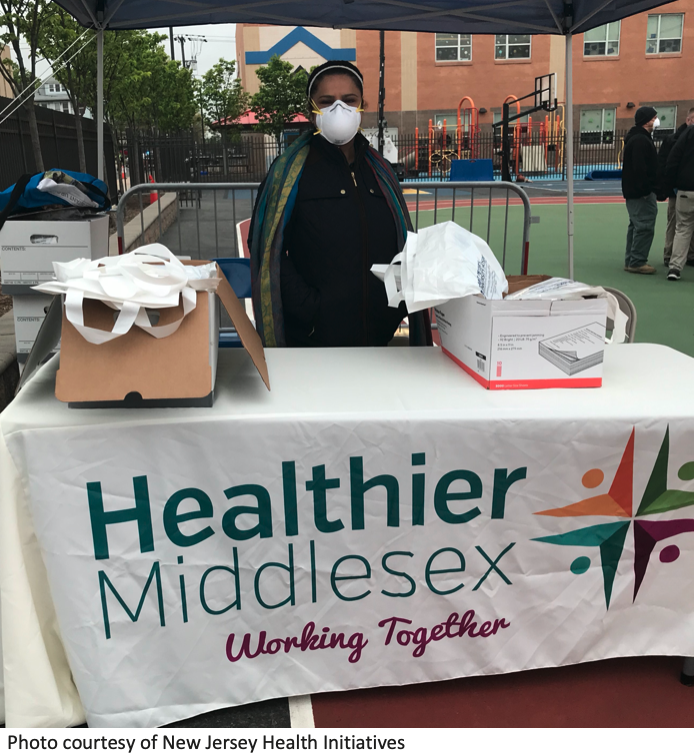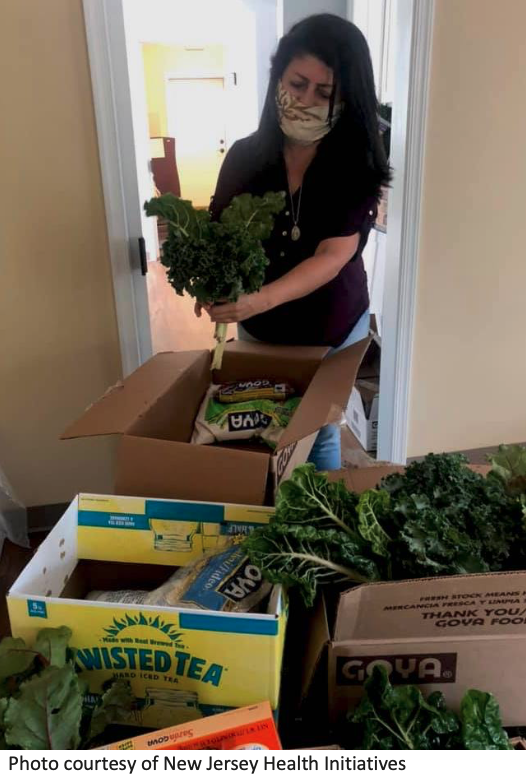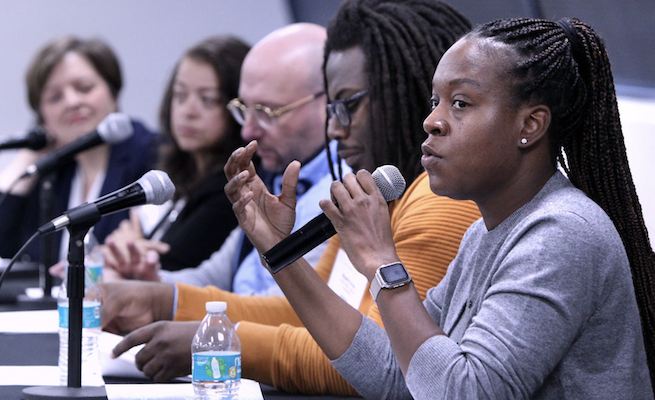Site Search
- resource provided by the Forum Network Knowledgebase.
Search Tip: Search with " " to find exact matches.

There is a plurality of definitions of the term systems change, each contextualized within different cultures and purposes. Doing Good Better embraces systems change as an inter-sector process that addresses complex social problems nonprofits and funders confront with collective action centered on equity, mutual respect, and resilience. Systems change refers to changing the parts and their relationships within a system with the understanding that this change will have ripple effects. As grantmakers, we need to create an environment that enables grantee effectiveness, so they can deliver on their mission. Systems change in philanthropy focuses on structures, policies and processes, resources, values, power, mindsets and, infrastructure that is illustrated in three iterative phases. In time, we hope that the application of this model will result in collective impact and a more resilient social sector for all of New Jersey.
The first phase is structural (operational) change, which involves funders adopting new policies, practices, and resource flows. The second phase is characterized by new relationships and connections that emerge from structural change eschewing old power dynamic practices. Finally, the third phase is transformative change, which occurs when change becomes rooted in organizational culture and mores. We cannot underestimate the length of time and learning at each stage. Achieving transformative change can be a long journey, but it is a learning journey. One grantmaker stated, “One change led to another and another, like dominos. I started to see what people meant by systemic change. New energy and excitement surged among us as hope grew and the cloudy vision of what we wanted became clearer and clearer.”
Although the figure below displays the six developmental stages as linear and distinct, change is unlikely to follow a linear path. Any change in a system will seldom stay fixed at one of these stages but rather will shift back and forth from one stage to another on the path toward the ideal state. We believe just one organization can’t shift the conditions that hold problems in place; we all must share the same perspectives and move the sector together and simultaneously. We call for all of those involved in the sector to work together to build a better and more equitable nonprofit and philanthropy system for all New Jerseyans.
Graphic comes from “The Water of Systems Change” by John Kania, Mark Kramer, and Peter Senge.
Doing Good Better, a partnership of the Council of New Jersey Grantmakers and the New Jersey Center for Nonprofits, is a community of funders and nonprofits taking action against the power imbalances and racial inequities in philanthropy, nonprofits, and government.
The Trust-Based Philanthropy Project is pleased to announce a six-part webinar series addressing common questions, clarifying misconceptions, and exploring ways to overcome obstacles in implementing trust-based philanthropy. CNJG is pleased to share this opportunity with our members.
Series Description: Trust-based philanthropy is a philosophy and approach rooted in values of relationship-building, mutual learning, and systemic equity – with a vision of advancing a healthier and more impactful nonprofit sector. While this approach is generally associated with six core grantmaking practices such as multi-year unrestricted funding and streamlined paperwork, the day-to-day work of trust-based philanthropy is very nuanced and dynamic. In fact, funders who have embraced this approach are finding that it requires ongoing self-reflection and rigor with regards to how they think about – and evolve – many of the deeply embedded practices and assumptions of traditional philanthropy.
Given these nuances, it is not surprising that there are many questions and occasional misperceptions about what it actually means to embody trust-based philanthropy in practice. In this 6-part webinar series, the Trust-Based Philanthropy Project will explore some of the most commonly asked questions and the underlying misperceptions that may be roadblocks to understanding and operationalizing trust-based philanthropy.
Each session in the series will focus on a frequently asked question from the field, and will feature perspectives from foundation leaders and others who have grappled with similar or related questions. At the end of each session, participants will walk away with: 1) a deeper and more nuanced understanding of the underlying cultural philosophy of trust-based philanthropy; 2) tips for how to think about and approach these nuances in their own work; and 3) talking points for how to answer these FAQs when they come up from colleagues or peers.
Each session will also provide dedicated space for small-group peer dialogue (among CNJG members) about ways to implement these practices into your grantmaking.
Who should attend: Anyone in a grantmaking role that is curious about understanding the nuances of trust-based philanthropy and how it applies to your work. This series will be ideal for those who have some baseline familiarity with trust-based philanthropy and have questions about how it manifests in practice.
Please note: this webinar series is separate from CNJG’s 2023 Conference for the Social Sector, which features an in-person luncheon keynote by the Trust-Based Philanthropy Project. CNJG’s conference is open to both funders and nonprofits, so the keynote will differ from this series. Because CNJG’s Doing Good Better initiative leans on the principles of Trust-Based Philanthropy, we encourage our members to register for these sessions - as time allows - for funders to learn about different approaches to changing systems in New Jersey.
Demystifying Trust-Based Philanthropy Series Sessions
Session #1: Does Trust-Based Mean Unconditional Trust?
Session #2: Does Unrestricted Funding Automatically Make a Funder Trust-Based?
Session #3: How Do We Approach Risk and Due Diligence in Trust-Based Philanthropy?
Session #4: What Does Grantee Accountability Look Like in Trust-Based Funding?
Session #5: How Do You Measure Impact in Trust-Based Philanthropy?
Session #6: What Does Racial Equity Have To Do With Trust-Based Philanthropy?
Resources
Recording: Session 2: Does Unrestricted Funding Automatically Make a Funder Trust-Based?
Transcript: Session 2: Does Unrestricted Funding Automatically Make a Funder Trust-Based?
Presentation: Session 2: Does Unrestricted Funding Automatically Make a Funder Trust-Based?
Trust-Based Philanthropy Peer Exchange for Grantmakers
The 6 Practices of Trust-Based Philanthropy
Trust-Based Philanthropy in 4D Overview
Legal Considerations for Trust-Based Philanthropy
How to Show Up in a Trust-Based Way
From Creative Disruption to Systems Change
The Case for General Operating Support
Research: Restricted Gifts Have a Negative Effect
Capacity building enables nonprofit leaders and organizations to develop the skills and resources they need to improve their work. Since each situation is unique and circumstances are always changing, effective capacity-building support is tailored to best suit the needs of grantees. This publication offers practical guidance and considerations to help grantmakers design an impactful approach.
CNJG affinity and interest groups provide a valued forum through which New Jersey grantmakers can connect, exchange information, and learn from experts in a wide range of fields and sectors. Members with a focus on a particular geography or issue meet on a regular basis and are self-organized. For additional information or to discuss forming a new group, contact Chanika Svetvilas.
Camden Funders Affinity Group
Camden Funders Affinity Group provides a valued forum for grantmakers working in Camden to connect and exchange information and to hear from stakeholders working in benefit of Camden.
Culture Funders Affinity Group
The Culture Funders Affinity Group includes private and public grantmakers working in the arts and humanities across New Jersey. It aims to maximize the leadership potential and grantmaking abilities of those interested in developing a strong and thriving arts community in New Jersey.
Emerging Leaders in Philanthropy Affinity Group
The Emerging Leaders in Philanthropy Affinity Group’s mission is to nurture, develop and support professionals in the philanthropic sector across all departments/roles within foundations. Programming for the Emerging Leaders group is geared towards early and mid-career professionals and will serve as: a professional learning community for emerging professionals working in diverse positions; an opportunity for professional development and individual capacity-building that will lead to institutional change within the member organizations; and as a critical partner in the creation of a pipeline into senior/executive leadership in NJ philanthropy.
Environmental Grantmakers Affinity Group
The Environmental Grantmakers Affinity Group formed in 2007 to provide a network and sounding board for environmental grantmakers who share an interest in: (1) insuring a healthy environment for all residents of the Garden State; (2) preserving, restoring and regenerating natural resources, including air, water, land, energy resources, as well as native flora and fauna; and (3) encouraging solution-based responses to resource challenges, wiser use of resources, and sustainable practices at individual, public agency small business and corporate levels.
Finance & Investment Affinity Group
The Finance & Investment Affinity Group brings together grantmakers of all types and sizes to discuss financial market trends and to exchange strategies to help ensure the greatest endowment growth. At each meeting, the latest market performance reports and commentaries are also discussed.
Funders for NJ Education Affinity Group
The Funders for NJ Education Affinity Group connects those making grants in support of education and provides interested members with insights into current initiatives, research findings, and best practices. Past topics of discussion have included analyses of school funding, innovative educational programming, measuring teacher effectiveness and youth development programs and have included roundtable discussions of emerging trends and key issues.
Funders for Strong and Thriving Communities Affinity Group
The Funders for Strong and Thriving Communities Affinity Group is an intrastate, inter-disciplinary network of public and private investors interested in enhancing the quality-of-life of the residents that live within New Jersey communities, through place-based investment or philanthropy. The group aims to draw upon and leverage the knowledge of public and private sector experts in the field of community development; including affordable housing, economic development, job creation, neighborhood building, and services to children and families.
Health Funders Affinity Group
The Health Funders Affinity Group is a collaborative network of grantmakers dedicated to advancing a holistic and intersectional view of health across New Jersey. This group provides a platform to exchange grantmaking strategies, funding priorities, best practices, and valuable insights while fostering collaboration to address health-related challenges and opportunities across diverse populations and life stages.
New Jersey Corporate Philanthropy Network Affinity Group
The New Jersey Corporate Philanthropy Network Affinity Group convenes corporate funders whose giving footprint includes New Jersey. Meetings cover such topics as current and emerging trends in strategic philanthropy, the business case for Corporate Social Responsibility, marketing/branding, sponsorships, employee matching gifts, employee engagement/volunteerism, and more. Best practices are shared and opportunities for collaboration are offered. A traditional Round Robin, where current burning issues/questions are discussed closes out the meetings. We hope you will join us at an upcoming event.
Newark Funders Affinity Group
The Newark Funders Affinity Group began in 2010 as a result of the convening work of CNJG’s Newark Philanthropic Liaison. As of May 20th, 2025, the Newark Education Funder Affinity Group merged with the Newark Funders Affinity Group to ensure alignment and coordination among funders dedicated to the city. The group meets quarterly hearing from elected officials, senior government and educational leaders, members of the nonprofit community, and local civic stewards to better understand Newark's emerging needs and opportunities, all with the goal of leveraging grantmaking for greater impact.
Paterson Funders Affinity Group
The Paterson Funders Affinity Group helps facilitate awareness of work by nonprofits and funders in Paterson, foster collaboration, and improve the lives of Paterson residents. Past meetings have focused on information regarding funder projects in the city, including some new grants made and lessons learned on ongoing projects in the areas of education, health and nutrition, arts and culture, and civics.
Trenton Area & Mercer County Funders Affinity Group
The Trenton Area & Mercer County Funders Affinity Group’s goal is to explore the most pressing needs and issues in the Trenton and Mercer County region and to uncover ways to leverage resources and develop solutions to this community’s greatest concerns. Past meetings have included roundtable discussions on the unique needs of the Trenton area and guest speakers that highlighted the dynamic interrelationship between the City of Trenton and the State of New Jersey.
CNJG’s 2024 Affinity Group co-chairs (name/affinity group):
Front row: Sharnita Johnson/Culture Funders; Leslie Walker/Camden Funders; Bill Leavens/Environmental Grantmakers; Julia Stoumbos/Paterson Funders; Chanika Svetvilas/CNJG’s Manager of Programs and Learning
Back rows: Theresa Jacks/CNJG’s President and CEO; Kevin Callaghan/CNJG’s Newark Philanthropic Liaison; Shakirat Odunsi/CNJG’s Manager of Communications; Julie Holland/Paterson Funders; Katherine Nunnally/Trenton Area and Mercer County Funders; Jasmyne Beckford/Newark Funders; Monica Hall/Emerging Leaders; Erik Estrada/Camden Funders; Jessica Nugent/Health & Aging Funders; Sharif Braxton/Health & Aging Funders; Liz Crowley/Environmental Grantmakers
Not pictured: Tammy Herman/Culture Funders; Alana Vega/Emerging Leaders; Rich Riberio/Finance & Investment; Paul Stierhoff/Finance & Investment; Jessica McKenzie/Newark Education Funders; Pat Hartpence/NJ Corporate Philanthropy Network; Etta Denk/NJ Corporate Philanthropy Network; Kortney Swanson Davis/ Education Funders; Melissa Litwin/Education Funders
Current Vacancies (as of 4/2024): Trenton & Mercer County Funders (1); Strong & Thriving Communities Funders (2); Newark Funders (2)
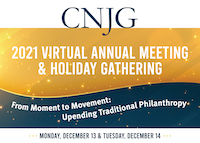
From Moment to Movement: Upending Traditional Philanthropy
Dates & Time:
Monday, December 13 - 2:00 to 3:30 pm -- Annual Meeting Workshop
Tuesday, December 14 - 12:30 to 2:00 pm -- Business Meeting & Keynote Presentation
The Council of New Jersey Grantmakers thanks everyone who attended our 2021 Virtual Annual Meeting & Holiday Gathering.
The 2021 Annual Meeting, From Moment to Movement: Upending Traditional Philanthropy, tackled how we can implement practices based in trust, confront uneven power structures, and advance equity in the philanthropic sector.
Our Annual Meeting Workshop on December 13 explored how two foundations, The Claneil Foundation and Weingart Foundation, are using general operating support, multi-year funding, and transparent communication and feedback to build strong, effective relationships with nonprofit partners. Afterwards, funders discussed where they want to move the needle in their own organization, and the major barriers to implementing those changes.
On Day 2, we heard an inspiring keynote presentation from Marcus Walton, President and CEO of Grantmakers for Effective Organizations (GEO). Marcus kicked off the keynote by sharing critical insights for building trust within and outside your organization. He then engaged in a candid conversation with CNJG President and CEO Maria Vizcarrondo, and answered questions from attendees, on how to reach communities, rethink traditional grantmaking practices, and advance racial equity within philanthropy and New Jersey.
Philanthropy needs to change to meet this moment. Breaking away from ingrained structures and replacing outdated “best practices” with strategies based in trust and power sharing is a long and challenging road for many grantmaking organizations. There will be growing pains. But, during this year’s Annual Meeting & Holiday Gathering, we heard about effective strategies from courageous leaders that have made these changes possible. Join us in 2022 as we continue to rework, reimagine, and operationalize new practices that better serve our partners and communities.
CNJG members can view recordings from the event and additional resources when logged in.
In response to the murders of George Floyd, Breonna Taylor, Tony McDade, Ahmaud Arbery, and countless other Black individuals, we have seen a call to end systemic racism, police brutality, and injustice. To explore philanthropy's role in fighting against racism and injustice, CNJG is sharing information about upcoming programs that we and our Philanthropy-Serving Organizations are presenting and other resources below. While some programs or resources have been organized in direct response to recent protests and calls for action, all are part of a longer conversation on racism in our country and within our sector. As CNJG weaves equity into all of our work, we look forward to continuing these conversations with you.
We realize this is not a comprehensive list, and we are posting items that CNJG staff sees, which is not nearly enough. We ask that our members, especially those who are black and brown, to help us find articles written by, resources created by, and programs led by people of color. Share those resources by emailing us. This page is just a part of our work in equity. We created this page as one starting point for New Jersey’s philanthropic community to engage in conversations, do background reading, attend programs, learn, and take action.
For those members interested in continuing the conversations, we invite you to join our Racial Equity listserve, by emailing Craig Weinrich. On that listserve, members can share information, resources, and opportunities that are helpful to the funding community.
Visit these Websites
Asian Americans/Pacific Islanders in Philanthropy (AAPIP) Resource Directory
This Supporting API Communities Resource Directory was developed to mobilize the philanthropic sector towards meaningful action in the midst of heightened violence and hate targeting Asian American communities.
Participatory Grantmaking
A curated list of resources and articles from Candid on the movement of participatory grantmaking that engages the community in the grantmaking process.
The Power of Asset Framing: A Conversation with Trabian Shorters
This blog post by the Skillman Foundation contains a series of short videos by Trabian Shorters, founder and CEO of BMe Community, who describes shifts in narrative that all philanthropy should consider.
Putting Racism on the Table
This site created by the Washington Regional Association of Grantmakers is the inspiration for CNJG’s Race, Racism and the Ramifications for Philanthropy Series.
Race to Lead Series
A site with reports and surveys on the racial leadership gap in the nonprofit sector.
Stanford Social Innovation Review
The Struggle to Overcome Racism, a list of resources to help leaders of social change and activists.
Trust-Based Philanthropy Project
A peer-to-peer learning and advocacy initiative to make philanthropy more based on trust.
Igniting Equitable Systems Change Together
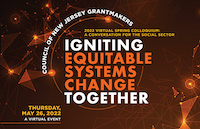
Date: Thursday, May 26
Time: 1:00 to 5:00 p.m.
On May 26, the Council brought together recognized thought leaders from philanthropy and nonprofits for a conversation exploring how the social sector can advance systems change.
Grantmakers and nonprofits grapple with complex, structural issues every day, and take on the difficult questions to move our collective work forward.
During a dynamic discussion, panelists shared strategies to empower proximate leaders, remove structural barriers and build the capacity of grassroots organizations, and shift mental models to challenge assumptions and strengthen nonprofit-funder relationships. After the panel, case study presenters highlighted three local examples of systems change, emphasizing the importance of cross-sector collaboration, collective action, and community engagement. Then, attendees gathered together for small group discussions to unpack key takeaways and discuss their own successes and challenges with systems change.
One of the most highly regarded convenings for social sector leaders in the state, the 2022 Virtual Spring Colloquium considered the power and cultural shifts needed to advance systems change through philanthropic and nonprofit partnership.
Attendees can revisit Whova to access event features such as session recordings, exhibitor virtual booths and sponsor pages, NJ Poetry Out Loud performances, and more.
| Agenda | |
| 1:00 - 1:30 pm: | Opening Session Featuring Sponsors & Exhibitors |
| 1:30 - 2:00 pm: | Break & Independently Visit with Sponsors & Exhibitor Virtual Booths |
| 2:00 - 3:30 pm: | Panel Discussion & Case Study Presentations - Igniting Equitable Systems Change Together |
| 3:30 - 4:00 pm: | Small Group Discussions |
| 4:00 - 4:15 pm: | Break & Independently Visit with Sponsors & Exhibitor Virtual Booths |
| 4:15 - 5:00 pm: | Networking Reception Featuring NJ Trivia |
Native Voices Rising is a joint research and re-granting project of Native Americans in Philanthropy and Common Counsel Foundation. This report focuses on the practices and challenges of community organizing and advocacy, focusing on the need for increased investment in and sustained support for American Indian, Alaska Native and Native Hawaiian communities.
During 2023, CNJG gathered benefits information from our members to generate our 2023 New Jersey Philanthropy Benefits & Salary Summary Report. Members tell us that this report is one of the most important and effective benchmarking tools for our field. A statistically significant number of members completed our Benefits Report. We are grateful to those that completed the survey, which is a major investment of time, to help us gather this useful data.
The report consists of two sections:
CNJG Benefits Survey
CNJG and our members want specific data about the benefits offered to their employees, board, and more. Therefore, CNJG created our triennial Benefits Survey that gathered this comprehensive data specific to New Jersey’s grantmaking community.
For the second time in this survey’s history, we asked for board and staff demographic data. As more attention is focused on racial equity in our work, it is helpful to benchmark this data in graphical form. We hope it sparks conversation at your organization.
Council on Foundations (CoF) Salary Survey
The salary survey was administered by our partners, the Council on Foundations. This annual nationwide effort by CoF (with the assistance of other Philanthropy-Serving Organizations across the country) benchmarks the salaries of employees at foundations, corporate giving programs, and other philanthropic organizations. CNJG encourages any and all members to complete this survey each year.
Salary information from CoF presents national, mid-Atlantic, and New Jersey data for over 40 staff positions. Salary ranges are only given for positions with five or more reporting organizations. To report on more New Jersey salary data, we hope more members will complete this annual survey.
CNJG reminds our members and other foundations across New Jersey to complete both surveys when they are available – CoF’s is EVERY YEAR, and CNJG’s is every three years. The more data we and CoF can gather, the better and more accurate the results will be for the philanthropic community both in the state and nationally.
Download the 2023 New Jersey Philanthropy Benefits & Salary Survey Summary Report here. You must be a member of CNJG and logged in to access the report.
CNJG's past Summary Reports may be found on our website:
2020 New Jersey Philanthropy Benefits & Salary Survey Summary Report, released in January 2021
2017 New Jersey Foundation Benefits & Salary Summary Report, released in September 2017
2014 New Jersey Foundation Benefits & Salary Summary Report, released in February 2015
2011 Mid-Atlantic Foundation Benefits & Salary Summary Report, released in June 2012
Small BIPOC organizations and/or historically excluded/led
organizations have greater access to funding.
Affirmation: We must center the most marginalized, underfunded, and impactful organizations.
BIPOC, grassroots, and/or historically excluded1 leaders are the most proximate to the populations and communities that face the most pressing social issues and should be central to designing solutions and funded; yet they are often overlooked or ignored as real change-makers.
They are underinvested in by major funders and are often left to struggle on their own; and when they are funded, grants are small and often highly restricted.
Some funders have artificially high budget requirements, require collaboration with larger “more sophisticated” organizations, won’t fund fiscally sponsored groups, or emphasize leadership requirements that are increasingly out of date or exclude vital lived experience.
Community organizations are exploring innovative and egalitarian management structures, such as co-directorships, collectives, and collaboratives, that do not resemble the constructs of the past.
Leadership comes in all structures, sizes, and identities; funders must seek to recognize and fund those who are doing effective work and re-evaluate their views of accepted leadership patterns. For BIPOC, grassroots, and/or historically excluded leaders to succeed, we must provide flexible resources and professional development support while they are leading.
Activities
Below are activities your organization can engage in that will advance your equity focus
• Agree as a community of practice to a shared definition of BIPOC, grassroots, and/or historically excluded-led organizations to foster a common frame of reference to help guide this work.
• Create networking and referral opportunities for BIPOC, grassroots, and/or historically excluded leaders to expand their access to funding and opportunities similar to that of larger, mainstream groups.
• Invest in the development and pipeline of BIPOC, grassroots, and/or historically excluded leaders.
• Remove funding barriers for small BIPOC, grassroots, and/or historically excluded organizations that have traditionally been precluded from funding because of budget size, leadership structure, auditing requirements, and similar obstacles.
• Actively partner with BIPOC, grassroots, and historically excluded organizations to make funding decisions on issues closest to their communities.
• Provide significant, multi-year, general operating funding to organizations and movements led by BIPOC, grassroots, and/or historically excluded communities.
Short-term Outcomes
• Progress is tracked into addressing the barriers to funding BIPOC, grassroots, and historically excluded-led organizations in NJ.
• A greater number of BIPOC, grassroots, and/or historically excluded-led organizations are funded than before, by new and existing funders.
• Professional development and capacity building as requested by BIPOC, grassroots, and/or historically excluded leaders is funded.
Long-term Outcomes
• BIPOC, grassroots, and/or historically excluded leaders can access funding and opportunities similar to that of larger, mainstream groups.
• A greater percentage of support to organizations and movements led by BIPOC, grassroots, and historically excluded communities is provided as significant, multi-year, general operating funding. In this context, “significant” can refer to both the quantity, size or percentage of grants awarded by the funder in any given year.
How to Begin Doing Good Better on Equity
Learning opportunities
• Which criteria and practices are creating, perpetuating or exacerbating exclusion of BIPOC, grassroots, and or historically excluded-led organizations?
• For funders that exclude or limit funding to small organizations, why are these barriers in place? What biases or missed opportunities are resulting from these obstacles?
• When funders are actively prioritizing BIPOC, grassroots, and historically excluded -led organizations in their philanthropic partnerships, what definitions, outreach, and partnership strategies are being used? How has this evolved based on lessons learned?
Pre-Work
• Funders should become educated about how traditional ways of identifying grantees and other criteria often excludes BIPOC, grassroots, and/or historically excluded-led organizations.
• Actively seek and share ways to center, identify, fund, and partner with applicants or community-based partners to create solutions in all efforts.
• Identify forums or protocols for introductions, dialogue, and relationship-building between funding community and BIPOC, grassroots and/or historically excluded-led organizations to pave the way for ongoing or stronger partnerships.
These news articles show our members’ responses to the coronavirus pandemic, including announcements, emails, blogs, grants and other resources. If you have items to add, please email us.
Actions and Announcements
Audible Creates Global Center for Urban Development and Hires Aisha Glover to Help Lead It
Russell Berrie Foundation Post: Our Response to COVID-19
Campbell Soup to pay hourly employees premium during outbreak
Post: Our Response to COVID-19
Geraldine R. Dodge Foundation
Dodge signs CoF pledge
Grunin Foundation 3/13 COVID-19 Announcement and 3/31 COVID-19 Update
Johnson & Johnson’s lead COVID-19 vaccine candidate shots for early 2021 authorization
Robert Wood Johnson Foundation
Culture of Health Blog: Handwashing to Slow the Coronavirus Pandemic
Opinion: Racism is the other virus sweeping America during this pandemic by Julie Morita, M.D
Opinion: Disabled Americans can’t be a COVID-19 afterthought by Dr. Richard Besser
Culture of Health Blog: Incarceration Rates: A Key Measure of Health in America
Opinion: In Covid-19 Crisis, Philanthropy’s Attention Must Focus on People With Disabilities
Brief: Health Equity Principles for State and Local Leaders in Responding, Reopening & Recovering from COVID-19
Culture of Health Blog: Lessons for an Equitable COVID-19 Response and Recovery
Kessler Foundation has produced two COVID related podcasts:
Practical Tips to Help Survive the Pandemic as a Parent of a Child with Autism
COVID-19 and Spinal Cord Injury: Minimizing Risks for Complications
New Jersey Council of Humanities Op-ed: Staying Human During the Pandemic
New Jersey Health Initiatives’ Deputy Director of Programs, and CNJG Board Member Diane Hagerman penned “Collaboration across county lines is key to a healthy New Jersey” on NJ Spotlight.
New Jersey Council for the Humanities and New Jersey Historical Commission present a webinar series for cultural nonprofits navigating the COVID-19 pandemic
New Jersey Economic Development Authority assists more than 10,000 small businesses impacted by COVID-19
New Jersey State Council on the Arts partners with ArtPride New Jersey Foundation on “Keep Jersey Arts Alive” campaign.
Newark Arts and the City of Newark Retools Its Ambitious Arts Grant Program to Respond to COVID-19
Nicholson Foundation Email to Grantees
Nicholson honors their own Colette Lamothe-Galette, lost to COVID-19
OceanFirst Foundation and Grunin Foundation along with Townsquare Media Launch Acts of Kindness Campaign
Subaru teams up with TerraCycle on PPE recycling
Turrell Fund Email to Grantees about CARES Act
Turrell Fund manages new Passaic County Pandemic Partnership hosted at the Community Foundation of New Jersey
United Way of Greater Mercer County Op-ed message from Sandra Toussaint
Valley National Bank offers Community Pledge CD to help donate and save at the same time
Resources
Newark Trust for Education COVID19 Resources
New Jersey State Council on the Arts Resources for Artists and Arts Organizations
Video: Hear from recognizable native New Jersey voices about the importance of donating to the New Jersey Pandemic Relief Fund
PKF O’Connor Davies: Grantmaking During Disasters & Tax-favored Financial Assistance to Employees
In 2003, with member support, CNJG commissioned a report on the impact a potential conversion of Horizon Blue Cross Blue Shield to a for-profit might have on access to health care in New Jersey. Research from the Center for State Health Policy (CSHP) at Rutgers University, provided details about the law governing such conversions in New Jersey and the experience of other states with conversions. The report identified questions raised in other states when such conversions occur, especially about the valuation of assets, the impact on low-income families, and the operation of the philanthropic foundations that have been established as stewards of the assets generated by the conversions. CNJG’s purpose was to seek answers to critical questions relevant to the availability of healthcare coverage for New Jersey’s citizens and to discuss models of best practice for healthcare conversion foundations across the United States.
From the Commonfund, these white papers on investment policy statements, spending policy, board governance and risk tolerance, together with their most recent studies of investments at private and community foundations, operating charities and nonprofit healthcare organizations are made available though CNJG's Investment Forum for Foundations and Endowments.
Excellence in Giving
In 2005, CNJG adopted Guiding Beliefs & Principles to offer a thoughtful source of direction and inspiration to help guide our state’s philanthropic sector into the future. CNJG first launched its Excellence in Giving initiative in 2007 with the goal is to provide grantmakers the practical tools necessary to ensure best practice in their operations and grantmaking.
The first booklet, Guiding Beliefs & Principles for New Jersey Grantmakers includes a wealth of insights and tips related to board governance, legal compliance, grantee communications, fiscal responsibility, public disclosure, and many other key areas of foundation governance and operations. It contains wisdom provided by leaders of all types of giving organizations within the CNJG’s membership, and is intended to serve as a practical resource to assist New Jersey foundations in their grantmaking. CNJG’s board is in the process of updating these beliefs and principles in 2023/2024. For more information on the updating process, please contact Theresa Jacks.
 In 2010 CNJG released a second, comprehensive resource to help the state’s philanthropic community understand their ethical, legal, and fiduciary requirements and obligations - What Every Grantmaker Should Know and Frequently Asked Legal Questions. These two booklets are key publications in CNJG’s Excellence In Giving Series. While the Guiding Beliefs & Principles is available publically, members will need to log into access the legal guide for download.
In 2010 CNJG released a second, comprehensive resource to help the state’s philanthropic community understand their ethical, legal, and fiduciary requirements and obligations - What Every Grantmaker Should Know and Frequently Asked Legal Questions. These two booklets are key publications in CNJG’s Excellence In Giving Series. While the Guiding Beliefs & Principles is available publically, members will need to log into access the legal guide for download.
Members can request additional copies of the booklets mentioned on this page by contacting Theresa Jacks.
Inspiring Change through Leadership: Maximizing Philanthropic Impact
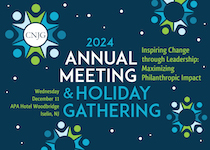 Wednesday, December 11, 2024 - 9:00am to 3:00pm
Wednesday, December 11, 2024 - 9:00am to 3:00pm
Luncheon, Keynote Presentation & Workshop
Location: APA Hotel Woodbridge, 120 Wood Ave S, Iselin, NJ 08830
The Council of New Jersey Grantmakers thanks everyone who attended our 2024 Annual Meeting & Holiday Gathering. On Wednesday, December 11, over 130 Council members and special guests gathered to celebrate the holiday season, welcome new CNJG members, convene our annual business meeting, and feature a dynamic discussion related to the vital work of philanthropy.
The Council’s 2024 Annual Meeting & Holiday Gathering was the place where CNJG members and New Jersey’s philanthropic community came together to share ideas about the important work they’re doing. It also provided a valuable opportunity to connect with colleagues.
This year’s theme, Inspiring Change through Leadership: Maximizing Philanthropic Impact, featured keynote speaker Amalia Brindis Delgado of the Panta Rhea Foundation.
The Annual Meeting included a workshop that explored the New Jersey Principles for Philanthropy. An overview of the Principles was presented, followed by a panel of fellow CNJG members who discussed how they are already using the Principles within their organizations. Attendees also had time to discuss how they could leverage the New Jersey Principles for Philanthropy to make changes within their own organizations.
Annual Meeting Photos
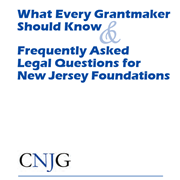
This guide was designed to help the state’s philanthropic community understand their ethical, legal, and fiduciary requirements and obligations.
How the government can partner with impact investors to unleash new capital, talent and energy for maximum impact.





